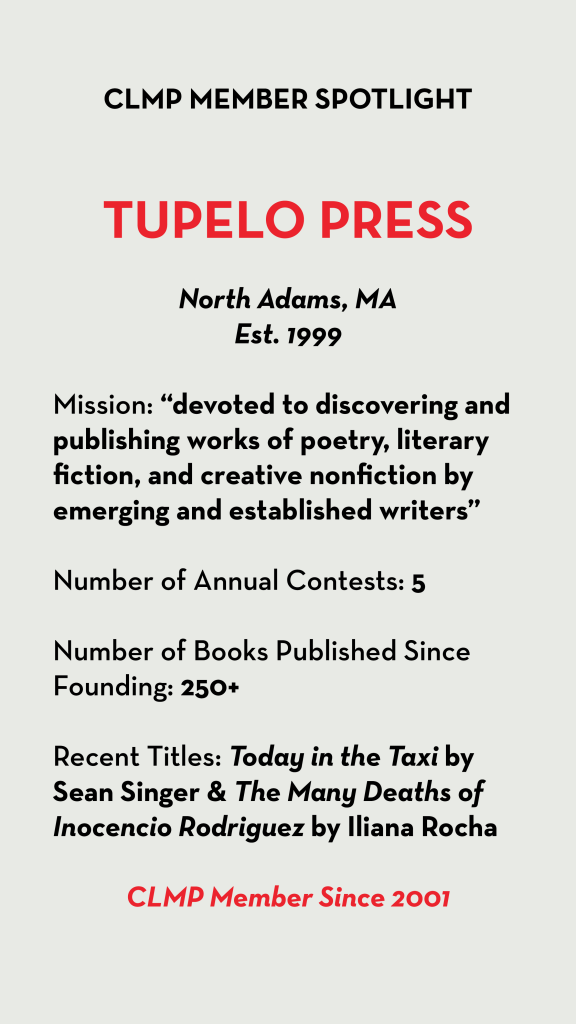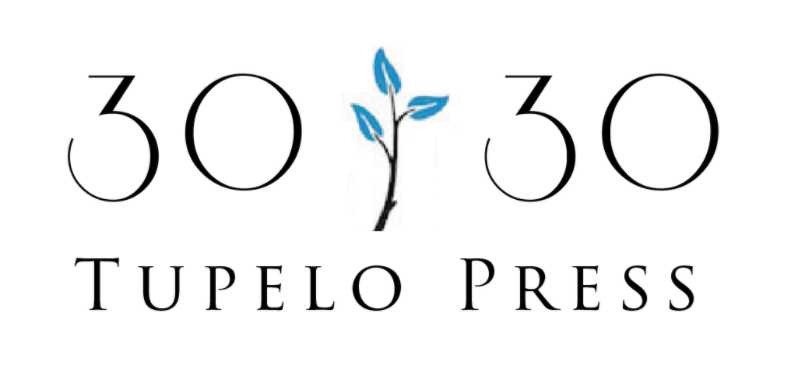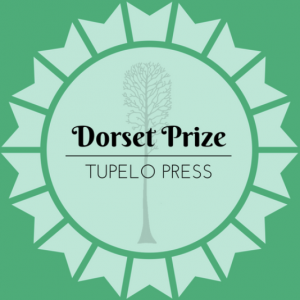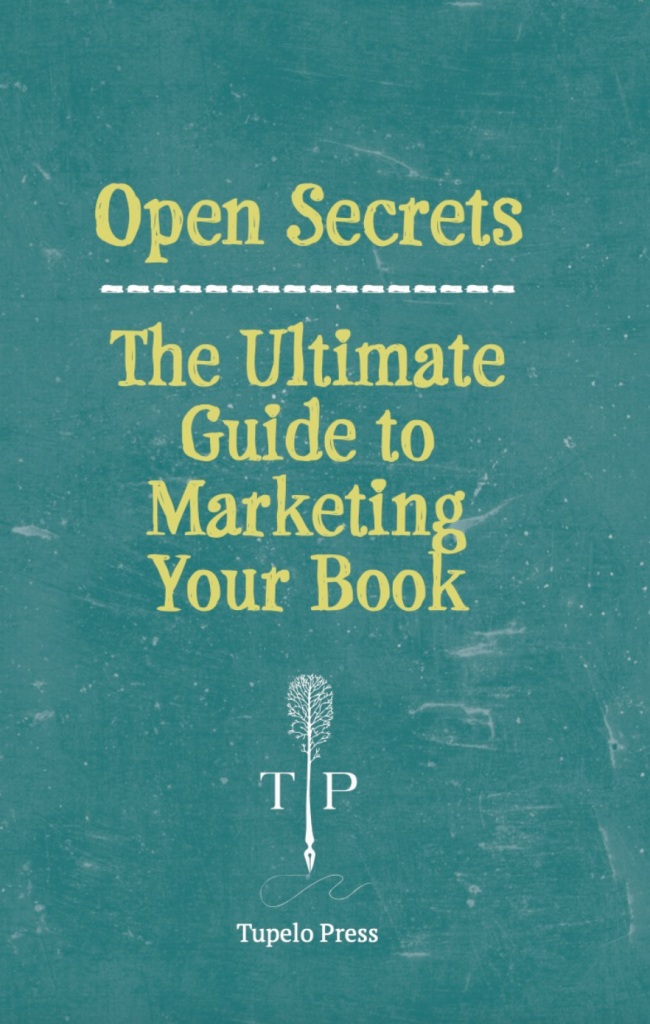We spoke with Jeffrey Levine, founder and publisher of Tupelo Press, in our latest Member Spotlight.
What is the history behind Tupelo Press? When was it founded and what is its mission?
 In late 1999 we rented a little room up a steep set of stairs from a small post office in rural Walpole, New Hampshire. With a single desk, telephone, laptop, and our heads filled with crazy ambition, we launched Tupelo Press. Of course, we didn’t have a clue, but we had an idea about discovering great new writers, and about providing a platform for poets who most needed one: especially women, writers of color, and the LGBTQ+ community. Our mission has been and continues to be inclusive.
In late 1999 we rented a little room up a steep set of stairs from a small post office in rural Walpole, New Hampshire. With a single desk, telephone, laptop, and our heads filled with crazy ambition, we launched Tupelo Press. Of course, we didn’t have a clue, but we had an idea about discovering great new writers, and about providing a platform for poets who most needed one: especially women, writers of color, and the LGBTQ+ community. Our mission has been and continues to be inclusive.
I don’t think there’s an independent literary press in the land that doesn’t continue the good work. We humans rely upon writers: for story, for beauty, for ideas, for commiseration, for challenge, for a sense of companionship in deep, existential waters. Those of us who publish, like those of us who write, have an obligation to participate as fully as possible in the life of letters.
Here at Tupelo Press, we have sought to make it our mission to extend the boundaries of independent literary publishing. Certainly, we publish books—250 in the past 22 years—with which we aim to develop wider audiences for, and deeper understanding of, innovative, multicultural writing by essential participants in this dialogue, and we continue to provide a necessary platform for underrepresented authors. But also, the name Tupelo Press describes a community: a family of related literary impulses, energies, and productions. Tupelo Quarterly, our digital literary journal, publishes 300 works each year; Tupelo Seminars offers monthly educational outreach; the 30/30 Project provides a poetry incubator to nine poets each month; and the Teen Writing Labs offers on-site and (soon) online writing workshops for teens nationally. The object of these many, overlapping circles of literary activity and educational outreach is to create a thriving community of readers, writers, teachers, editors, mentors, students, and alumni.
Can you tell us about the 30/30 Project?
 The 30/30 Project is a poetry incubator that offers poets of all backgrounds an opportunity to grow their confidence as writers and establish a literary community. Rooted in collaboration, reciprocity, and literary citizenship, the 30/30 Project helps poets to develop a body of work through daily discipline in their writing process. They build their readership base during (and after) their month of participation, all the while supporting independent publishing.
The 30/30 Project is a poetry incubator that offers poets of all backgrounds an opportunity to grow their confidence as writers and establish a literary community. Rooted in collaboration, reciprocity, and literary citizenship, the 30/30 Project helps poets to develop a body of work through daily discipline in their writing process. They build their readership base during (and after) their month of participation, all the while supporting independent publishing.
Ten years ago, the 30/30 Project began when a friend of Tupelo Press wanted to find a way to conquer her writer’s block. We suggested that she write 30 poems in 30 days, and we’d publish her work daily on an online “bulletin board.” Nine poets jumped aboard this ship the following month, and by the end of 2021, incredibly, more than 1,000 volunteer poets globally have embarked on their own poetry marathons, each writing 30 poems every day for a month. Our 30/30 poets join a vast, supportive alumni network full of potential readers and collaborators. 30/30 alumni have published work generated during their 30/30 months in more than 200 unique literary journals and magazines. Since its inception, the project has offered annual alumni readings, a series of mini-craft talks for writing poets, and discounts on Tupelo Press books and poetry conferences.
Importantly, the program is also an open-ended fundraiser. We ask participant poets to reach out to friends, family, and colleagues to sponsor their daily work, much like a walk-a-thon. The 30/30 Project makes it possible for Tupelo Press to continue to expand the diversity of the literary canon, provide exposure for participating poets, and increase their confidence and visibility.
Tupelo Press also publishes the literary journal Tupelo Quarterly. How do the press and journal relate to or inform one another?
 While Tupelo Press is known for publishing artisan-quality paper editions, Tupelo Quarterly offers a wealth of additional possibilities for bridging poetry and the fine arts in a digital landscape. With that in mind, we have devoted a section of the magazine to “Collaborative and Cross-Disciplinary Texts,” featuring cinepoetry, video poems, performance work, sound poems, text and image projects, and sculptural poems. This collaborative and cross-disciplinary section aims to showcase the full range of forms that this exchange between the literary arts and the fine arts can take. In recent issues of Tupelo Quarterly, our collaborative and cross-disciplinary offerings have included new work by Rachel Eliza Griffiths, Nick Flynn, Rachel Blau DuPlessis, David Dodd Lee, Kate Greenstreet, and more. This impulse toward hybridity, in many ways, supports and deepens Tupelo Press’s existing goal of exploring the possibilities for dialogue between poetry and the fine arts. There’s also a good deal of cross-pollination. We regularly invite finalists and semi-finalists in our various contests, as well as writers who have submitted to our open reading period, to contribute work to Tupelo Quarterly.
While Tupelo Press is known for publishing artisan-quality paper editions, Tupelo Quarterly offers a wealth of additional possibilities for bridging poetry and the fine arts in a digital landscape. With that in mind, we have devoted a section of the magazine to “Collaborative and Cross-Disciplinary Texts,” featuring cinepoetry, video poems, performance work, sound poems, text and image projects, and sculptural poems. This collaborative and cross-disciplinary section aims to showcase the full range of forms that this exchange between the literary arts and the fine arts can take. In recent issues of Tupelo Quarterly, our collaborative and cross-disciplinary offerings have included new work by Rachel Eliza Griffiths, Nick Flynn, Rachel Blau DuPlessis, David Dodd Lee, Kate Greenstreet, and more. This impulse toward hybridity, in many ways, supports and deepens Tupelo Press’s existing goal of exploring the possibilities for dialogue between poetry and the fine arts. There’s also a good deal of cross-pollination. We regularly invite finalists and semi-finalists in our various contests, as well as writers who have submitted to our open reading period, to contribute work to Tupelo Quarterly.
Tupelo Press accepts submissions through several contests as well as through an open reading period. How do these submission opportunities differ?

We offer five annual submission opportunities for poets: two contests for full-length books of poetry, two contests for chapbooks, and one open reading period. Translators are welcome to submit their work at any time, and without a reading fee, through the translation portal.
The Dorset Prize is a poetry competition open to all poets, everywhere in the world. That said, and interestingly, many first and second books have won the Dorset Prize: a result that gives us immense satisfaction. We like to think of the Dorset Prize as one of the most rigorous and important poetry prizes anywhere.
When in 2008 Tupelo Press moved from Dorset, Vermont, to North Adams, here in the Berkshire Mountains of Massachusetts, we wanted to create an opportunity exclusively for poets working on their very first or second books. The Berkshire Prize for a First or Second Book of Poetry furthers our mission to discover new writers—poets doing superb work—who haven’t yet found a home.
We created the Snowbound Chapbook Award to honor the sort of project-centered urgency that the chapbook form avails. The phrase “full-length book” creates an entirely arbitrary designation, when you think about it. A book is a book is a book. But the chapbook has long been viewed as the stepchild to the “full-length” book. We wanted to offer a way of recognizing that the chapbook is itself a fully fledged form, and that form is rife with spectacular creative challenges and opportunities.
We added the Sunken Garden Chapbook Award several years ago at the request of the Hill-Stead Museum in Farmington, Connecticut, which has long produced one of the most successful and sought-after readings in the country, offered every summer in their outdoor “Sunken Garden” and drawing audiences for poetry numbering in the thousands. So, this contest is a second opportunity for those poets dedicated to the somewhat shorter, hardly lesser, format—and an opportunity to read for an audience of more than a thousand poetry lovers.
While submissions to these contests are read anonymously, and finalists’ (and often semi-finalists’) manuscripts are handed up to a nationally known judge for a final decision, we devised the July Open Reading Period as a way for us (Editor-in-Chief Kristina Marie Darling, Poetry Editor Cassandra Cleghorn, and me) to involve ourselves directly as curators of our lists—to read everything submitted and to select three to five books annually that most urgently speak to us. In other words, the open reading period is not a contest, and submissions are not anonymous. It is, in fact, the method by which we decide how best to permit Tupelo Press to participate fully in the ongoing literary conversation. We are as likely to select a first book from a relatively unknown poet as we are to take a fully established author. We also take translations and chapbooks.
Tupelo Press recently published the staff-authored book Open Secrets: The Ultimate Guide to Marketing Your Book. What inspired you to work on this title? Can you tell us more about the writing and editing process?
 There’s an enormous hunger among the world of writers for the rather specialized knowledge that we editors and publishers can’t help but acquire in 22 years. We decided that one way to disseminate this industry-specific knowledge is to collaborate on a series of manuals. We’ll soon be publishing a guide to making the poetry manuscript, with contributions from Kristina Marie Darling, Ilya Kaminsky, Kathy Fagan, Lise Goett, Katie Farris, Cassandra Cleghorn, and myself. Early next year, if not sooner, Kristina and I will publish a nuts-and-bolts poetics manual.
There’s an enormous hunger among the world of writers for the rather specialized knowledge that we editors and publishers can’t help but acquire in 22 years. We decided that one way to disseminate this industry-specific knowledge is to collaborate on a series of manuals. We’ll soon be publishing a guide to making the poetry manuscript, with contributions from Kristina Marie Darling, Ilya Kaminsky, Kathy Fagan, Lise Goett, Katie Farris, Cassandra Cleghorn, and myself. Early next year, if not sooner, Kristina and I will publish a nuts-and-bolts poetics manual.
Open Secrets: The Ultimate Guide to Marketing Your Book comes as the result of many years of studying how the so-called market for poetry works, and how best to make a success of a book of poetry in an incredibly crowded market. Hand-in-hand with being good literary citizens is sharing what we know about launching a work of art in a commodity-obsessed world. How do you obtain reviews? How do you leverage the rapidly expanding and ever changing landscape of social media’s various platforms? How best to navigate some pretty choppy economic waters? Many years ago Tupelo Press made the decision many years ago to act as our own distributor, and since then, it’s been an eye-opening process, learning how to hire our own teams of national book reps; how to work with Ingram, SPD, and IndieBound; and how to utilize our own eCommerce capabilities. Independent presses survive only if poetry, literary fiction, and literary prose survive. As ever, education sits at the very center of permanence.
